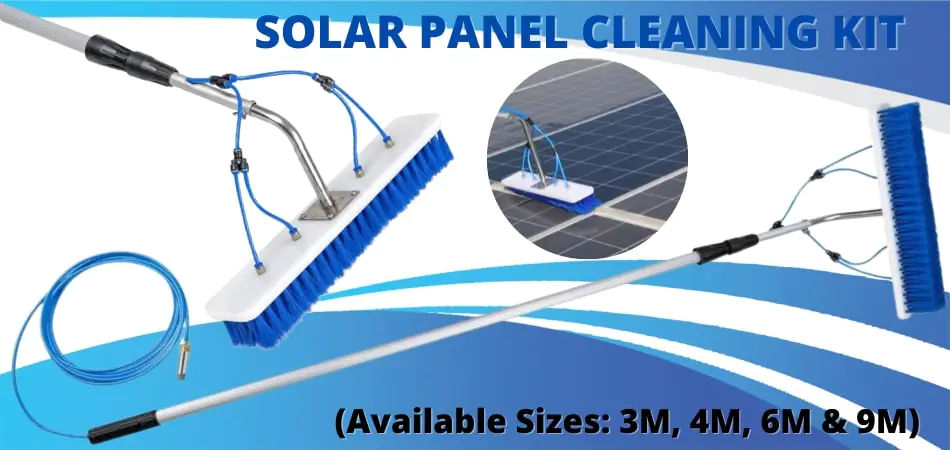Solar Panel Cleaning Kits, Latest Price
Introduction
Welcome to this comprehensive guide on solar panel cleaning kits! In this article, we will explore the significance of keeping your solar panels clean and the role that solar panel cleaning kits play in maintaining their efficiency. Solar energy is a clean and renewable source of electricity, and it is essential to ensure that your solar panels are free from dirt, debris, and other contaminants to maximize their power generation.
In this guide, we will provide you with an in-depth insight into solar panel cleaning kits, including their components, benefits, proper cleaning techniques, and maintenance. Let's dive into the world of solar panel cleaning kits and discover how to keep your solar panels shining bright!
 Why Clean Solar Panels?
Why Clean Solar Panels?
Solar panels rely on sunlight to generate electricity, and any obstruction or dirt buildup can reduce their efficiency. Here are a few reasons why cleaning your solar panels is crucial:
Maximize Energy Production: Clean solar panels can absorb more sunlight, converting it into electricity at a higher efficiency. By removing dirt, dust, pollen, bird droppings, and other debris, you can maximize the energy production of your solar panels.
Maintain Longevity: Regular cleaning helps prevent the accumulation of grime, which can lead to corrosion and damage to the solar panel surface. By maintaining clean panels, you can extend their lifespan and protect your investment.
Avoid Performance Loss: Dust and debris on solar panels create shading, causing uneven distribution of sunlight across the panels. This can lead to a decrease in overall power output. Cleaning your panels ensures uniform sunlight absorption, minimizing performance loss.
Environmental Factors: Depending on your location, environmental factors like pollution, pollen, bird droppings, and salt residue can accumulate on the solar panel surface. Regular cleaning helps mitigate the impact of these factors and keeps your panels operating at their best.
Solar Cleaning Kit Price List
| Model | Price |
| 3 Meter Solar Cleaning Kit |
Rs.3,999 |
| 4 Meter Solar Cleaning Kit |
Rs.4,499 |
|
6 Meter Solar Cleaning Kit |
Rs.4,999 |
|
9 Meter Solar Cleaning Kit |
Rs.5,499 |
Components of a Solar Panel Cleaning Kit
A solar panel cleaning kit typically includes the following components:
1. Cleaning Solution
A specialized solar panel cleaning solution is designed to effectively remove dirt, grime, and other contaminants without damaging the surface of the panels. It is formulated to be safe for use on solar panels and does not leave residue or streaks.
2. Soft Bristle Brush
A soft-bristle brush or a cleaning brush with non-abrasive bristles is used to scrub away stubborn dirt and debris from the solar panel surface. The bristles should be gentle enough to avoid scratching or damaging the panels while effectively removing dirt buildup.
3. Squeegee or Microfiber Cloth
A squeegee or a microfiber cloth is used to wipe away excess cleaning solution and ensure a streak-free finish. Microfiber cloths are gentle on the panels and leave no lint behind, providing a clear and clean surface.
4. Water Spray Bottle
A water spray bottle is used to wet the solar panel surface before applying the cleaning solution. It helps loosen dirt and grime, making it easier to remove.
5. Extension Pole
An extension pole is used to reach solar panels that are difficult to access. It allows you to clean panels on roofs or other elevated locations safely and effectively.
Proper Cleaning Techniques
To clean your solar panels effectively, follow these steps:

-
Safety First: Before starting, ensure that you can safely access the solar panels. If needed, use appropriate safety equipment like harnesses and secure footing.
-
Check Manufacturer Guidelines: Consult the manufacturer's guidelines or recommendations for cleaning your specific solar panel model. Some manufacturers may have specific instructions or cleaning solution recommendations.
-
Rinse with Water: Use a water spray bottle to wet the surface of the solar panels thoroughly. This helps loosen dirt and debris.
-
Apply Cleaning Solution: Apply the specialized solar panel cleaning solution to the surface of the panels. Avoid using harsh chemicals or abrasive cleaners, as they can damage the panel coating.
-
Scrub Gently: Use a soft bristle brush to gently scrub the panel surface in a circular motion. Pay extra attention to areas with stubborn dirt or residue. Avoid using excessive force to prevent scratching.
-
Rinse Off Cleaning Solution: Rinse the panels with clean water to remove the cleaning solution and any remaining dirt or grime. Ensure that no residue is left behind.
-
Dry with a Squeegee or Microfiber Cloth: Use a squeegee or a microfiber cloth to gently wipe away excess water from the panels. Start from the top and work your way down, ensuring a streak-free finish.
-
Inspect for Remaining Debris: After cleaning, inspect the panels for any remaining debris or spots. If necessary, repeat the cleaning process on stubborn areas.
Maintenance and Frequency
Regular maintenance and cleaning are essential to keep your solar panels performing at their best. Here are a few tips for maintenance:
Schedule Regular Cleaning: Establish a cleaning schedule based on location and environmental conditions. Cleaning your solar panels two to four times per year is recommended. However, dusty or high-pollution areas may require more frequent cleaning.
Monitor Performance: Keep track of the energy production of your solar panels. If you notice a significant drop in power output, it may indicate the need for cleaning.
Remove Debris Promptly: Remove leaves, bird droppings, and other debris from your panels as soon as possible. These can create shading and reduce energy production.
Consider Self-Cleaning Technology: Some solar panels come with self-cleaning technology, such as hydrophobic coatings or built-in cleaning systems. Check if your panels have such features and understand their capabilities and maintenance requirements.
